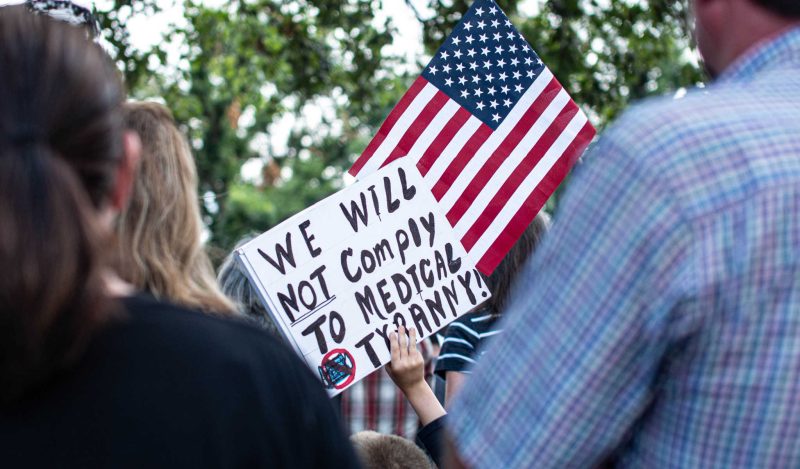During 2021, numerous private companies mandated COVID-19 vaccination for their employees, aligning with many government policies and recommendations. Thus, many workers were under pressure to either vaccinate – against their judgment – or lose their job. In response, numerous state legislatures considered bills limiting private firms in this regard. One reaction to this, from a free-enterprise perspective, is that private firms should be able to establish whatever workplace standards they wish, within Constitutional and employment law, and legislatures should keep their hands off.
I contend that this reaction is not correct as it misses much of the picture.
Fundamentally, the status quo is not where private firms simply make their own choices in a market economy. Instead, many firms depend on government contracts, tax breaks, subsidies, and favors, and also face many government regulations. Thus, they are incentivized to remain in the good graces of government, which may include issuing COVID-19 mandates to align with government pronouncements.
Firms seem to be under a tacit and invisible (to outsiders) set of regulations and incentives, largely established by executive branch agencies, to follow government “recommendations.” The tacit regulation, and its “recommendations,” are not justified by any sensible role for government. But with enough firms thus constrained, the competitive process for workers is stifled, with distortion toward firms requiring vaccines. This suggests that such firms are opaquely acting in the government’s stead, i.e., they are “state actors.”
Thus, a legislature’s intervention to limit private vaccine mandates could be beneficial by undoing detrimental tacit regulations of the executive branch. I come to this conclusion with trepidation. My instincts are to oppose governmental interference in private contracting.
Long experience shows that such regulation typically makes matters worse. Nevertheless, a case can be made for state legislative action in this situation. “Doing nothing” is not free-enterprise friendly; it simply cements in the status quo of tacit regulatory pressure. Legislative action may be the best option among unattractive alternatives.
Moreover, private COVID-19 vaccine mandates may violate common law doctrines regarding employee privacy and autonomy. The latter are largely consistent with free enterprise. Employer COVID-19 vaccine mandates seem beyond what employees would reasonably expect in their jobs, thus violating employment contracts.
Resolving employment law disputes is time-consuming and expensive. Establishing statutory law regarding employee privacy/autonomy concerning COVID-19 vaccines might reinforce the common law, but in an immediate way. However, this too has difficulties since statutory law forgoes the nuance of common law, where the latter is often tailored to each case.
These arguments are fleshed out below, along with related issues.
What Should Be the Status Quo? The Presumption of Liberty
My starting point is that the status quo should be free enterprise. One of its important bases is the presumption of individual liberty. This implies that individuals make the decisions regarding what to do and how to do it, as long as the like rights of others are respected. Reasons for its desirability are well-known: central authorities have neither the knowledge nor the incentives to make good decisions for individuals.
A government’s primary role is to facilitate interaction among individual decision-makers. This is accomplished, broadly speaking, through the establishment and enforcement of property rights and contract law. When this is problematic to do, these institutions, and their reliance on private action, have difficulty.
An example is external costs, such as air pollution, where one party imposes foul air on another who is not a part of the transaction. Though there is a presumption of liberty, it can be rebutted and this is an example where it may be rebutted, with government intervening. However, full rebuttal requires evaluating the effectiveness of government action.
A related example is communicable disease, where one party may pass infection and harm another. COVID-19 is an instance of this scenario. Note, though, that modern life seems chock full of externalities at some level, e.g., congestion, air pollution, noise, as well as exposure to the risk of disease. Many practices – such as traffic management, pollution restrictions, noise ordinances, nuisance law, and zoning, as well as social norms – serve to limit, though not eliminate, external costs.
As long as these are within reasonable bounds of what individuals anticipate, one presumes that people are “assuming the risk” of engaging with life. Expecting pure air, no congestion, and no chance of catching a virus is not reasonable.
COVID-19 and Government Policy: Can the Presumption of Liberty be Rebutted?
My assessment of the debate on COVID-19 is that the presumption of liberty has not been rebutted, and so severe government policy, e.g., lockdowns and vaccine mandates, is not justified. To meet the standard for rebuttal, the COVID-19 epidemic must be far outside the bounds of anticipated risks and the expected and actual effects of COVID-19 policies are credible and broadly accepted.
Regardless of one’s view, it is clear that COVID-19 issues are hotly contentious. Distinguished physicians, scientists, researchers, and analysts take opposing positions. There is serious disagreement regarding: (i) data accuracy on cases, fatalities, and the riskiness to most people; (ii) the effectiveness of mitigation methods (e.g., masking, business closures) and of non-vaccine treatments; and (iii) the safety and effectiveness of the vaccines.
In short, there is not convincing and broadly accepted evidence that justifies extensive intrusion on people’s everyday lives, i.e., the presumption of liberty is not rebutted. It is inconsistent with a free society, as well as common sense, for government to mandate a vaccine with reasonable concerns by many, including reputable experts, about its safety and efficacy.
Though erroneous, what prevents government from issuing such mandates? Constitutional law speaks to this. Federal COVID-19 vaccine mandates for private employers mostly have been enjoined. Regarding state government mandates, many legal analysts think they are Constitutional. However, Blackman (2022) argues that proper interpretation of precedent implies a contrary view.
The above refers to government mandates. What about private organizations? Owners and managers, as individuals acting for their organizations, have liberties as well. Should they be allowed to impose vaccination mandates on their employees?
Politics, Regulation, and Quid Pro Quos
As noted above, private businesses seem tacitly regulated to pursue policies favored by government. If so, firms are not making choices by exercising their rights and liberty. Tacit regulation is difficult to quantify; the very nature of tacit understandings makes them hard to detect. Yet for crony firms that attain preferred government treatment – via favorable regulation, subsidy/assistance programs, advantageous tax treatment, or government contracts – there is an implicit quid pro quo, i.e., there is a “price” of gaining favors. It comes via campaign contributions, related political support, but also in the form of public support for your benefactor’s policies. Moreover, non-crony firms must beware of the consequences of resisting regulators’ and government officials’ recommendations.
The upshot is that there is tacit pressure to adopt the government recommendations. Since government-ordered COVID-19 vaccinations are inappropriate, it surely is wrong to induce them indirectly via tacit government pressure.
Though the extent of the tacit pressure is difficult to assess, there is little doubt that the federal government dangles a large carrot and wields a big stick over private economic activity. Setting aside the COVID-19 spending surges, the US government’s budget is over one-fifth of the economy (and forecasted to go higher), coupled with powerful regulatory authority. Its influence creates considerable reliance on government. State government programs, taxes, and regulation add to this reliance.
Reliance on government, with the incentives that go with it, was strengthened with the passage by Congress of more spending and regulatory bills in 2021 and 2022. The “carrot” of government contracts/assistance and the “stick” of regulatory scrutiny, already sizable, loom even larger.
It is possible that some private firms would adopt employee vaccine mandates even without pressure. Granting this, it remains true that federal and state governments have large budgetary and regulatory powers over private firms. It is implausible that this power has an insubstantial effect on firms’ policies.
If firms are tacitly carrying out government directives when imposing vaccine mandates then, in legal terms, they are “state actors,” possibly making their actions unconstitutional. There are indications of private firms acting for the government, such as the collusion of the Biden Administration with social media companies to censor COVID-19 speech alleged in a recent lawsuit. This evidence suggests that private organizations are feeling government pressure regarding COVID-19, but it does not apply directly to influence on employer COVID-19 vaccination mandates.
Violating Common Law Employment Contracts
The common law of employment sets legal “defaults” for working conditions that comport with employees’ reasonable expectation for a particular job. This is consistent with free enterprise because firms may offer conditions outside those expectations as long it is made explicit. Thus, the common law allows parties freedom to find mutually preferred activities, but differences from the defaults must be stipulated. This applies to employee privacy and autonomy as well. Employers must justify (as a business necessity) any unusual or unanticipated intrusions on privacy/autonomy.
Vaccination is such an intrusion. Maintaining a safe workplace is a legitimate business interest, but trying to attain it via COVID-19 vaccinations is not something a reasonable person would expect given the realistic concerns, and lack of broad acceptance about, the vaccine’s safety and efficacy.
Thus, private-sector COVID-19 vaccine mandates may violate workplace contracts, though it requires costly and time-consuming litigation to establish this and thereby gain relief for workers.
Legislative Options
A “hands off” legislative approach regarding this issue is not consistent with free enterprise. This lets the tacit regulatory process continue and administrative agencies get their way, albeit murkily.
A legislative approach consistent with free enterprise is removing the excesses of the big spending, regulatory state that incentivizes and pressures private businesses to adopt government “recommendations.” This is a large endeavor and provides no immediate relief to workers.
One interventionist option is legislation to immediately ban private-sector vaccine mandates. Such bans normally are highly objectionable from a free-enterprise perspective. Usually, more regulations in addition to bad regulations worsen matters and may establish precedent for an even larger role for government. However, it offsets the tacit interference in the market already put in place by administrative agencies and offers immediate relief to workers. It may be the least worst among bad alternatives.
Another alternative is requiring broad mandate exemptions for religious, health, or conscientious reasons. These three exempt categories encompass virtually everyone and, if easy to obtain, make business mandates nearly meaningless. However, this tinkers with the employment relationship.
These options might be viewed, though, as establishing statutory law about employee privacy and autonomy that reinforces the common law. In this light, they are less objectionable. However, statutory law paints with a broad brush, while the common law is more nuanced and tailored to the case at hand. The latter is forgone with statutory law.
Another option is holding liable any business that mandates vaccination for harms vaccination cause. This is more consonant with free enterprise since those who cause harms assume their financial responsibility. However, determining the cause of a harm is often difficult and it is problematic to fully compensate a victim of a devastating medical event. Still, this can deter businesses from mandating vaccines.
Conclusion
Each legislative alternative is imperfect. But a legislature “doing nothing” is not free-enterprise friendly; it cements in the status quo of tacit regulation by administrative agencies. This is a bad outcome and a state legislature’s intervention to prevent this may be the “lesser evil.”
Join the conversation:


Published under a Creative Commons Attribution 4.0 International License
For reprints, please set the canonical link back to the original Brownstone Institute Article and Author.









